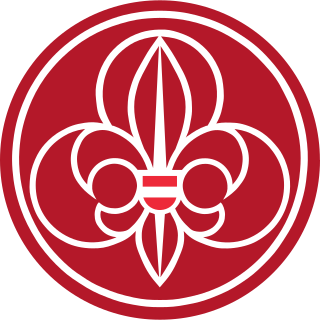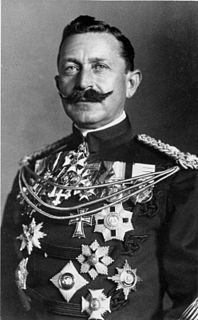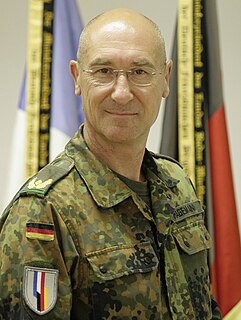Related Research Articles

Freiherr, Freifrau and Freiin are designations used as titles of nobility in the German-speaking areas of the Holy Roman Empire, and in its various successor states, including Austria, Prussia, Bavaria, Liechtenstein, Luxembourg, etc. Traditionally it denotes the titled rank within the nobility above Ritter (knight) and Edler and below Graf and Herzog (duke). The title superseded the earlier medieval form, Edelherr.

Generaloberst, in English colonel general, was, in Germany and Austria-Hungary—the German Reichswehr and Wehrmacht, the Austro-Hungarian Common Army, and the East German National People's Army, as well as the respective police services—the second highest general officer rank, ranking as equal to a 4 star full general but below general field marshal. It was equivalent to Generaladmiral in the Kriegsmarine until 1945, or to Flottenadmiral in the Volksmarine until 1990. The rank was the highest ordinary military rank and the highest military rank awarded in peacetime; the higher rank of general field marshal was only awarded in wartime by the head of state. In general, a Generaloberst had the same privileges as a general field marshal.

Pfadfinder und Pfadfinderinnen Österreichs is the largest Scouting and Guiding organization in Austria and the only one approved by World Association of Girl Guides and Girl Scouts (WAGGGS) and the World Organization of the Scout Movement (WOSM). The association claims more than 300 troops with more than 85,000 Scouts nationwide. WOSM and WAGGGS give quite smaller membership values for the PPÖ: 9,503 Scouts and 10,508 Guides.

Major-General Rudolf Anton Carl Freiherr von Slatin, Geh. Rat, was an Anglo-Austrian soldier and administrator in the Sudan.

Scout Association of Croatia is the Croatian national Scouting organization. As part of Yugoslavia, Croatia was a founding member of the World Organization of the Scout Movement from 1922 to 1948. Independently, Croatia has been a member of the World Organization since 1993. The coeducational Savez Izviđača Hrvatske has 3,827 members as of 2011.

Magyar Cserkészszövetség, the primary national Scouting organization of Hungary, was founded in 1912, and became a member of the World Organization of the Scout Movement in 1922 and again after the rebirth of Scouting in the country in 1990. The coeducational Magyar Cserkészszövetség had 8,145 members in 2011.

The Swiss Guide and Scout Movement (SGSM) is the national Scouting and Guiding association of Switzerland formed in 1987. Scouting was founded in Switzerland in 1912 and was among the charter members of the World Organization of the Scout Movement in 1922 and among the founding members of the World Association of Girl Guides and Girl Scouts in 1928. The SGSM has more than 42,000 members in about 550 local groups.

Scouting and Guiding Federation of Turkey is the national Scouting and Guiding federation of Turkey. It serves 33,974 Scouts and 2,883 Guides. The federation is a member of the World Organization of the Scout Movement since 1950, and the World Association of Girl Guides and Girl Scouts since 1987.

Scouting in Austria is served by multiple Scout associations, among them

Moritz Friedrich Joseph Eugen Freiherr Auffenberg von Komarów was an Austro-Hungarian Military officer in the Austro-Hungarian Army and Minister of War. At the outbreak of World War I, he took command of the Fourth Army.
Scouting has been active in displaced persons camps and in the lives of refugees since World War I. During and after World War II, until the early 1950s, Scouting and Guiding flourished in these camps. These Scout and Girl Guide groups often provided postal delivery and other basic services in displaced persons camps. This working system was duplicated dozens of times around the world. In the present, Scouting and Guiding once again provide services and relief in camps throughout war-torn Africa.

The occupation of Estonia by the German Empire occurred during the later stages of the First World War. On October 11–21, 1917, the Imperial German Army occupied the West Estonian archipelago, consisting of the islands of Saaremaa (Ösel), Hiiumaa (Dagö), and Muhu (Mühn).
Alexander Franz Anton Lion was the co-founder of the German Scout Movement.
Maximilian Bayer was the founder of Scouting in Germany, along with Alexander Lion. During World War I, he built the 27th Royal Prussian Jäger Battalion, later the core of the Finnish army.

General of the Infantry is a former rank of the German Ground forces. Presently it is an appointment or position given to an OF-8 rank officer, who is responsible for particular affairs of training and equipment of the Bundeswehr infantry.
Wilhelm Teuber-Weckersdorf was an Austro-Hungarian officer and a Scouting pioneer in Austria, popularly known within the Scouting movement as "Willy Teuber" or "Onkel Teuber".

The Deutscher Pfadfinderbund (DPB) was the first German Scouting association, and the forerunner of the Deutscher Pfadfinderbund (1945). It existed from 1911 until 1933, when it was disbanded by the National Socialists.

Seckendorff is the name of an old and prolific Franconian noble family. According to historian Werner Wagenhöfer, the Seckendorff family is the most researched family of the low nobility in Franconia along with the Guttenberg and Bibra families.
Elise Hermine von Hopffgarten, née Hennoch was a German author and founder of the Deutschen Pfadfinderbundes für junge Mädchen. On January 14, 1912, the Deutschen Pfadfinderbundes für junge Mädchen was founded at the instigation of Maximilian Bayer, in which several Scout groups existent since 1908, some of which previously were attached to the Wandervogel, merged. Hopffgarten was elected by the Assembly in the Pestalozzi-Fröbel-Haus to be the first chairman and held that position until 1922. In this role, she was editor of the club magazine and made numerous lecture tours around Germany, to promote Scouting. By mid-1914, the organization had 6,200 members. In 1915 the organization launched the Kriegsgarten "war gardens", in which children were taught horticulture and were fed.
References
- ↑ Pribich, Kurt (2004). Logbuch der Pfadfinderverbände in Österreich (in German). Vienna: Pfadfinder-Gilde-Österreichs. p. 7.